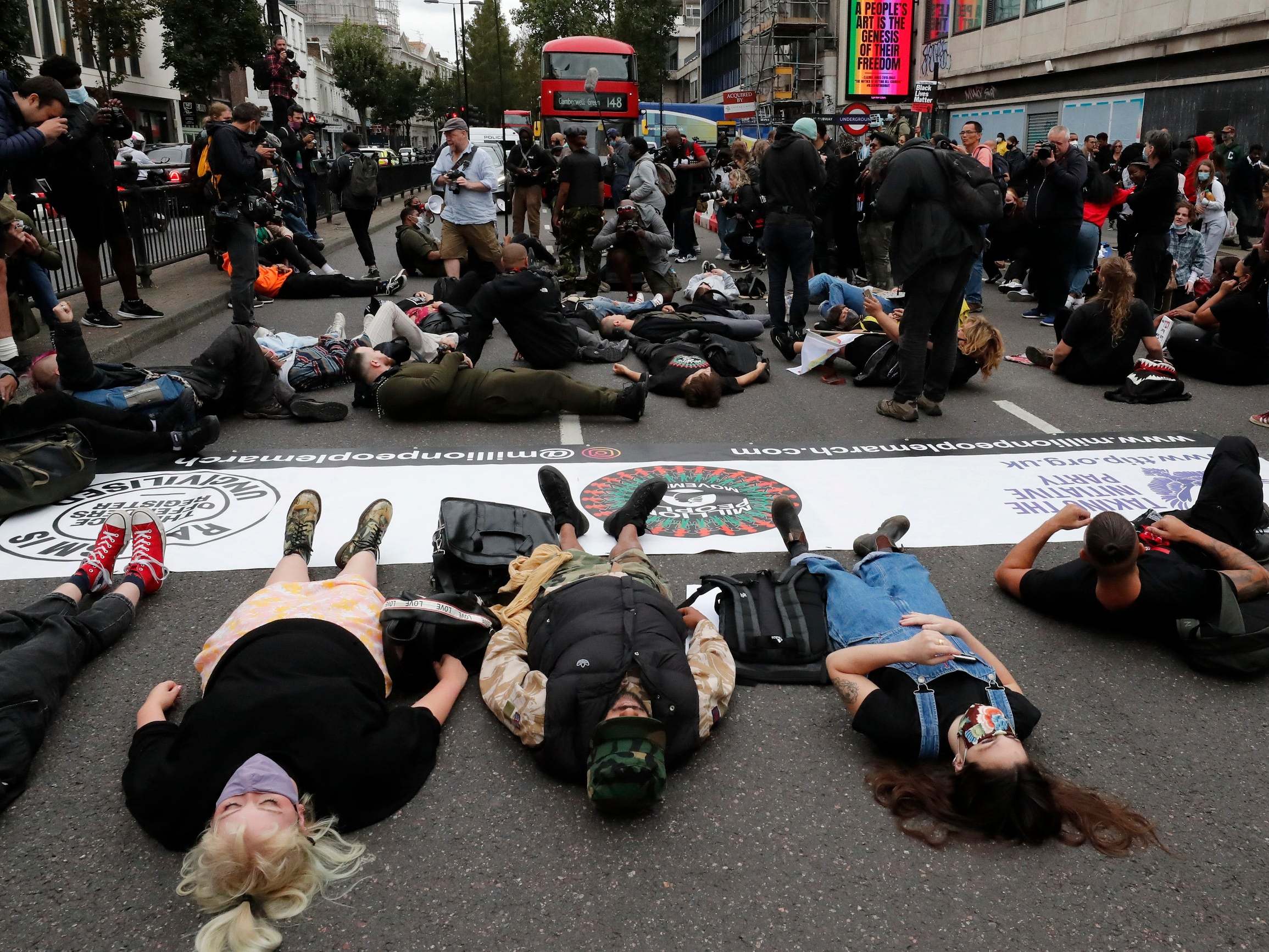Hundreds of anti-racism protesters join Million People March in Notting Hill
Rally goes ahead despite police warning over coronavirus restrictions

Anti-racism demonstrators took to the streets of London on a day that would normally have seen hundreds of thousands of people turn out for the Notting Hill Carnival.
The organisers of the inaugural “Million People March” said they wanted to give the community a louder voice in the wake of the Black Lives Matter protests sparked by the death of George Floyd.
Observers estimated that the group swelled to around 400 people as it travelled from Notting Hill to Hyde Park at 1pm on Saturday.
Protesters chanted “The UK is not innocent” and “Enough is enough” and lay down in the road while raising their fists at several places along the route. At one point they broke into a rendition of “Redemption Song” by Bob Marley
The march was organised by Ken Hinds, an adviser to Scotland Yard; Sasha Johnson, a youth worker and activist; rapper 2 Badda, and author Anthony Spencer, after the traditional Notting Hill Carnival was cancelled due to the coronavirus pandemic.
“This is not a hardened protesters march, this is a family protest march for people who don’t normally protest,” Mr Spencer said.
“We’re trying to have a louder voice. This is like a rowing expedition from one side of the Atlantic to the other side on a little boat. It’s a huge task.”
The group’s manifesto includes diverting police funding into youth and community services and ending excessive use of force and stop and search against black people.
They also want the government to introduce a race offenders register – which would work in the same way as the system for sex offenders – to help employers stamp out racism and abusive behaviour.
Mr Spencer said: ”This is a fight that can be won by laws. The race offenders register is a tool that we believe can begin the changing of behaviour right across wherever racism exists.
“We’re looking at bringing in laws to protect our black citizens. We protect everything else. We protect dogs, we protect eagles, we protect dead statues. Let’s protect black people.
“Once we see there’s actual true intention to protect the lives of black people and change systemic suffering, we will stop marching and we will work with the government.”
Ms Johnson said she hoped the movement would “empower the community to strive for better”.
“As a people, we’re not going to stop until we have equal rights and justice,” she said. ”Our message is listen to us, hear our words, we want sustainable and tangible change.
“We don’t just want tokenistic promises, we don’t want it to come from a hegemonic standpoint. We want it to be for the people.”
Ahead of the Bank Holiday weekend, the Metropolitan Police warned campaign groups they could be committing a criminal offence by taking part in gatherings of more than 30 people.
On Saturday Piers Corbyn, the brother of former Labour leader Jeremy Corbyn, was arrested at a protest against lockdown restrictions and the wearing of face masks in Trafalgar Square.
He later tweeted that he had been held for 10 hours and fined £10,000 for organising the event after being reported under the new coronavirus legislation.
Mr Corbyn told the Huffpost he would refuse to pay the penalty notice and added: “There was no justification whatsoever for this fine. The order for my arrest appears to have come from on high, nothing to do with local police. When I asked the police, they said to me it came from on high.”
Metropolitan Police commander Bas Javid said the force’s response to each event may be different "according to our operational decision making, based on information given to us subject to the new legislation”.
He added: “There have been a number of demonstrations in central London and we were actively out on the ground, speaking with people taking part continuing to emphasis the public health risk and the regulations, and that it was incumbent on them to fulfil the requirements under the new legislation to check the position and ensure that they were not committing an offence by being involved in a large gathering or they may be subject to a large fine.”
Additional reporting by Press Association
Subscribe to Independent Premium to bookmark this article
Want to bookmark your favourite articles and stories to read or reference later? Start your Independent Premium subscription today.

Join our commenting forum
Join thought-provoking conversations, follow other Independent readers and see their replies